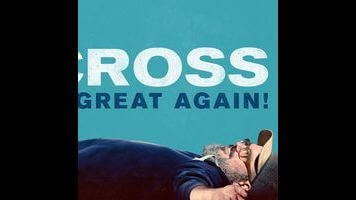David Cross is riled up about Making America Great Again!

In an interview about his recently completed stand-up tour, Making America Great Again!, David Cross explains that he’s had a lot of walkouts. Indeed, about midway through this Netflix special filmed at an April performance in Austin, director Alex Coletti cuts to a shot of one woman striding purposefully up the aisle and out of the theater. Cross has explained that he intentionally took his first stand-up tour in six years to some places likely to be less receptive to his brand of confrontational political comedy than his home bases of Los Angeles or New York. Still, Austin is hardly the hotbed of the kind of conservatism that is Cross’ most consistent target. In the special, Cross expresses incredulity that, at this point, anyone would be unprepared for what he does onstage. (“Oh, hey, Tobias is in town? I didn’t know he told jokes!”) But in Making America Great Again!, Cross takes his signature sardonic outrage to some dark places indeed.
The piece that appears to have precipitated that woman’s early exit is perhaps Cross’ most provocative ever, a wrenching little playlet about an NRA-beholden lawmaker, a heavily armed intruder, and “take your daughter to work day” that the comic stretches out in more and more harrowing detail until even his largely receptive audience is audibly squirming. There’s a sadistic virtuosity to the bit that, like much of Making America Great Again!, sees Cross essentially daring his audience to laugh—or not laugh. Or walk out.
Cross, sporting a Randy Quaid-esque beard, is similarly shaggy as ever in his delivery at times. His style is conversational and anecdotal, punctuated by the occasional clever zinger. After making one hacky bit of wordplay (“patriot-jism”), he admonishes everyone for laughing, assuring them that it will, of course, be cut out of the special. Cross’ biggest weakness has always been his unwillingness to shape his material. After building up to a rant, he’ll often trail off—rather than snap off—the bit, leaving the audience to register that the joke has indeed ended with awkward silence. He will work his way up from bafflement at some new absurdity, build in intensity via some rapid-fire wordplay, then, as in a bit about a crazy guy ranting on the streets of New York, dribble off abruptly. On Mr. Show, Cross once played a performance artist named Spank, a caricature of left-wing comics who, in their strident political hectoring, forget to be funny. The line between Spank and Cross—as one suspects Cross knows—can grow thin without careful construction, and here his occasional lapses crop up again.
But if Making America Great Again! doesn’t flow, its individual bits are uniformly strong and biting. Cross has come with a mission this time—to make people angry. His style of satire can seem like preaching to his crowd, except that he repeatedly goes out of his way to implicate audience members. His Austin audience—walkouts aside—is largely prepared to agree with Cross’ mockery of the NRA, Republicans, Trump and his supporters, and the like. But throughout, Cross seems determined to offend them, too. Seeing crowd members complacently following his broadsides against what he terms the selfish isolationism at the core of the American character, Cross hurls their laughter back at them, sneering, “This is Texas. You guys are the kings of, ‘Leave me alone. We don’t want to give poor people health care! Fuck you, we’re gonna be our own country.’” Noted atheist Cross spins a fantasy about all the world’s religious leaders being forced to confront their own common humanity, then silences the crowd’s applause with a nasty, lacerating punchline that sucks the air from the auditorium. Cross, at his best, isn’t interested in facile affirmation. He’s out to piss people off, and Making America Great Again! shows him in top form.
Whether coming hard after Trump (not yet the Republican presidential nominee at the time), Ayn Rand’s hypocritical triumphalism, the NRA, organized religion, murderous police officers, or anti-PC types, Cross resolutely refuses to let anyone off the hook—even those who agree with him. It’s potent because it hits directly at the idea that political satire affects only those already receptive to it. After a long, expertly constructed run about police violence that keeps returning to the same punchline (“And I’m not just talking about the cops”), Cross greets the uneasy laughter by asking, “You know who doesn’t like that bit? Cops.” That gets a tension-deflating laugh before Cross works up his anger again, exclaiming, “They’re murdering us! Well, not us—we’re white.” Tension restored.
Alternating angrily articulate ranting with writerly, well-crafted punchlines, Cross works his audience over relentlessly. The show is bookended with some of his more innocuous railing against nonsensical things like luggage stores inside airports and overly pretentious product catalogs. Funny stuff, but, even more than in the past, the feeling that Cross is anxious to get to the dark heart of his material is palpable. Like the best satirists, what Cross targets most is hypocrisy and complacency. In his gun control material—the workplace shooting bit above, plus Sandy Hook and a “modest proposal” about his drastic plan to hire someone to stage a single, final mass shooting—Cross cuts deep into the head-nodding agreement that something must be done and draws gasps (the comic’s version of drawing blood). In his best material, Cross graphically shows his audience that crafting jokes out of horrors means creating things as horrifying as they are funny.